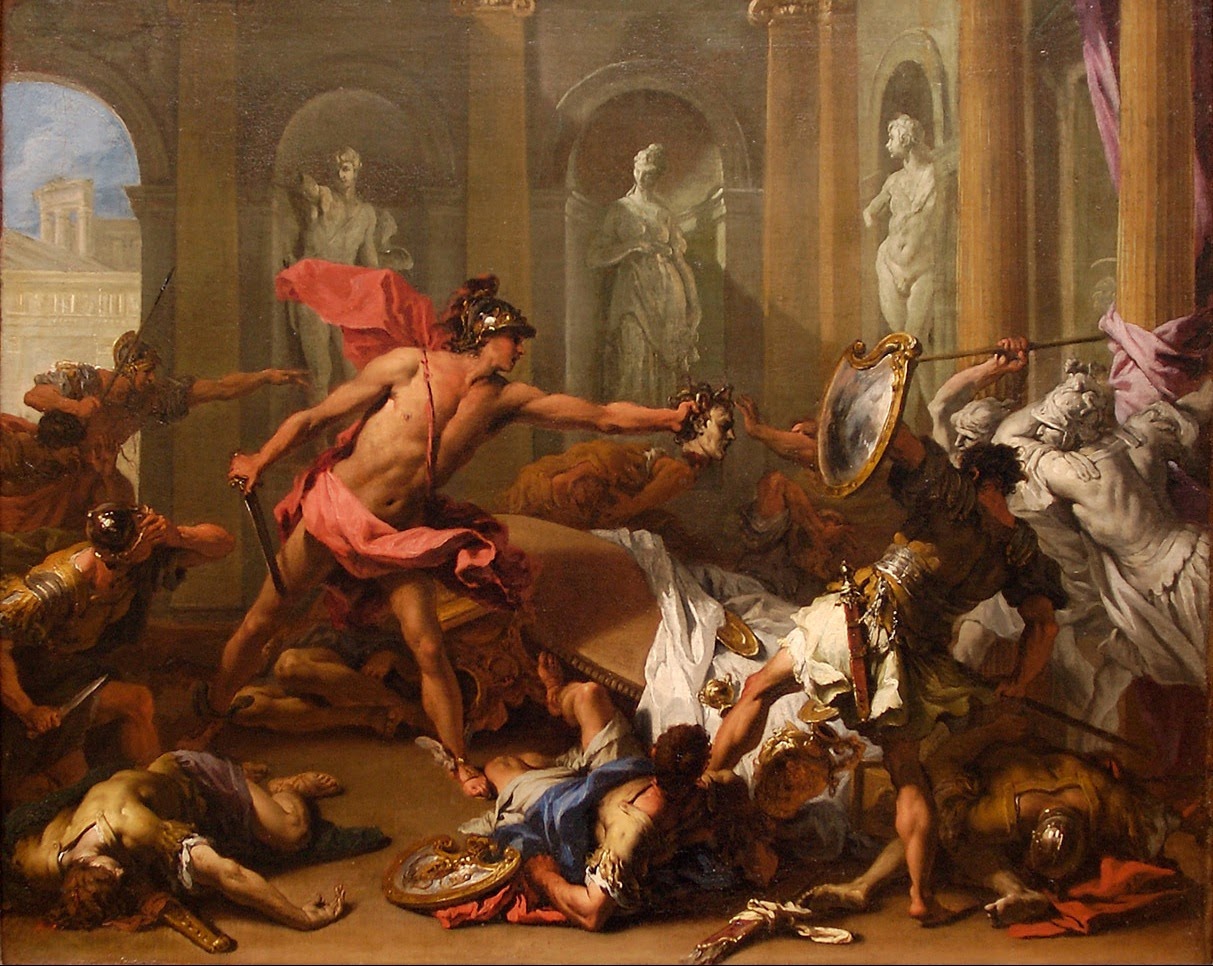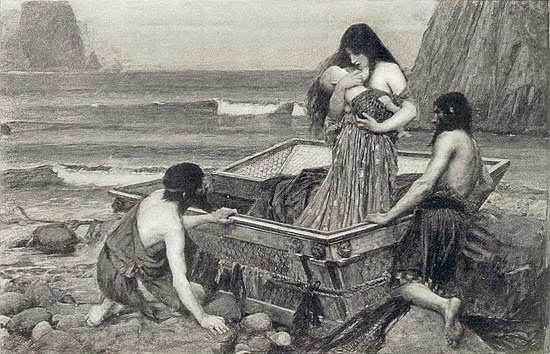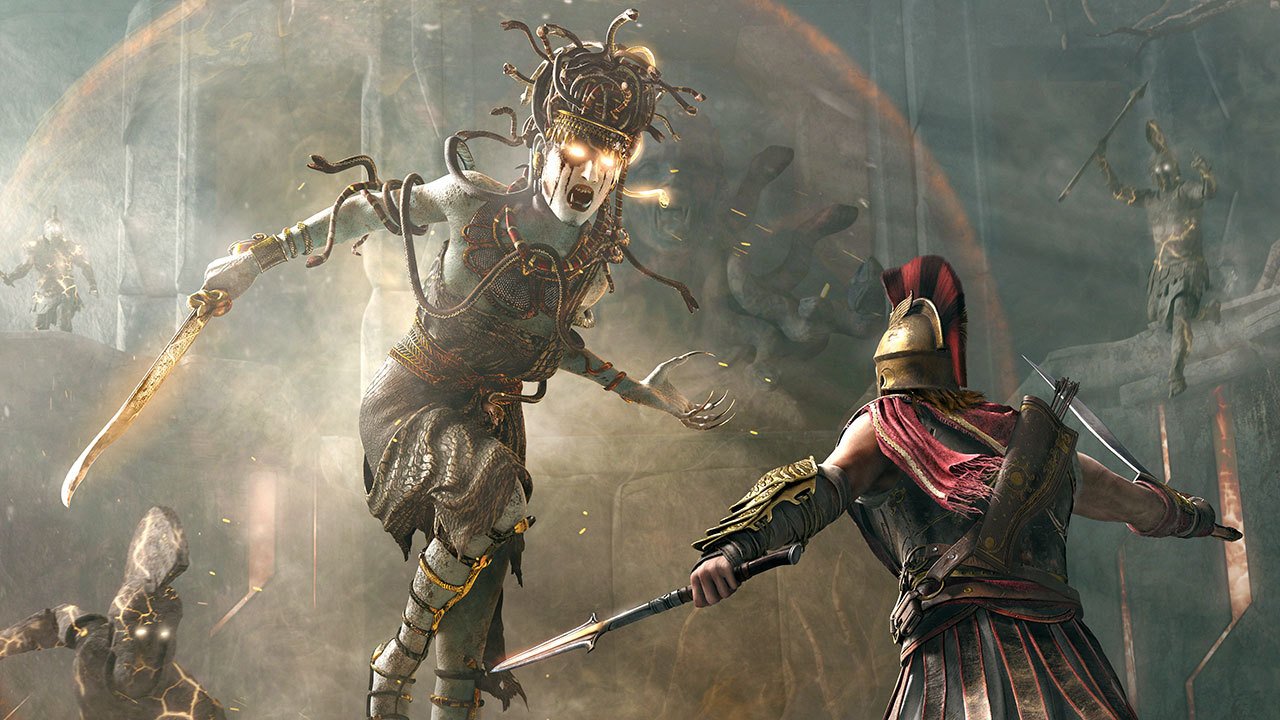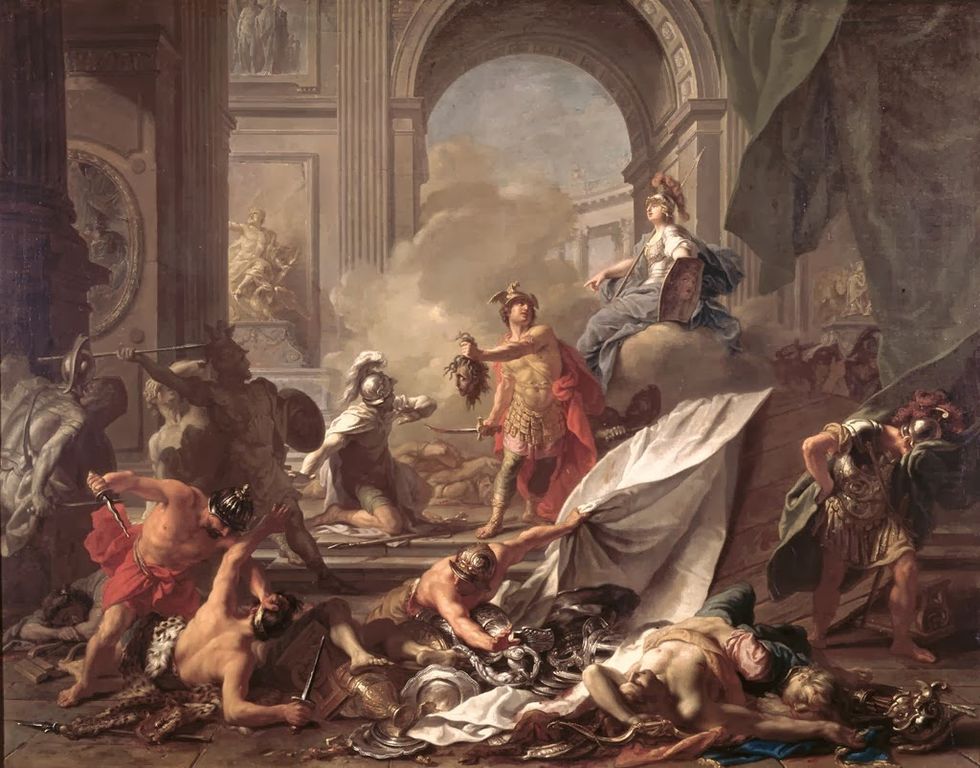Perseus
The heroic demigod, ancestor of Hercules, with the legendary journey, the Medusa's head, and the rescue of Andromeda.

Perseus was the son of Zeus and Danaë, who was the daughter of Acrisius, the king of Argos. Acrisius named his daughter Danaë to honor his ancestor Danaus, even though he wished to have a son rather than a daughter. Thus, he decided to consult the oracle to learn about his fate. The oracle predicted that his daughter would bear a son. Acrisius was pleased with this news, but the oracle added that this son would eventually kill him.
Terrified by this prophecy, Acrisius took measures to prevent it from coming true. He built an underground chamber with walls covered in bronze plates and imprisoned Danaë there. However, what was destined to happen eventually did occur. Zeus had seen Danaë and fell in love with her. He transformed into a shower of gold, entered through the cracks of the prison, and approached Danaë. Soon, Danaë gave birth to a son.
Acrisius, enraged, heard the cries of the newborn child in the underground chamber. He decided to kill Danaë and her son, Perseus. To avoid doing it himself, Acrisius devised a different plan. He placed Danaë and Perseus in a sealed chest and cast them into the sea. He hoped that the waves would quickly swallow them and that he would not be personally involved in their demise.
Nevertheless, once again, Acrisius's precaution proved futile. Neither Danaë nor Perseus perished in that ordeal. The waves carried them to Serifos, where the sealed chest washed up on a shore.

A fisherman named Dictys took care of the two castaways. Perseus grew up to be a handsome and brave young man, and the old Dictys proudly considered him as his own son. However, the island was ruled by a tyrant named Polydectes, who had taken Danaë as his wife, if Perseus had not guarded his mother so zealously. Thus, the king decided to remove the young man. He pretended to be very fond of Perseus and invited him to his palace. During a banquet, he asked everyone what gift would be most suitable for a king. All present said that the most royal gift would be a horse. Only Perseus replied that he considered such a gift very ordinary. Instead, if Polydectes desired it, he would feel quite capable and worthy of bringing the head of the Gorgon.
The Gorgon was Medusa, a young and unique mortal among three monstrous sisters who lived far away, at the edge of the ocean, at the remote end of the Earth. Her head was surrounded by snakes and from her mouth protruded two large boar tusks. The Gorgons' hands were made of bronze and their golden, winged pinions allowed them to fly. However, above all, her gaze was deadly. It was dazzling and incessant, and anyone who dared to look at it was instantly turned to stone. The king saw the opportunity he had been waiting for, hearing Perseus's words, and commanded him to bring the head of Medusa.

Guided by Hermes and Athena, Perseus set out the next day to acquire several magical items: winged sandals, a pouch to hide the head he would acquire, and a cloak of invisibility from Ares that made the wearer invisible. He stole these items from three immortal Graeae, who knew the location of the Gorgons. The Graeae were repulsive creatures who could see only through a single eye, which they used alternately. Perseus tricked them, stole their only eye, and forced them to show him the way.

Now Perseus had only one item left, the bronze harpe, a powerful and sharp sword given to him by Hermes. When Perseus arrived, he found the Gorgons asleep. It was the right moment. With his winged sandals, he flew high and approached Medusa without looking at her. The goddess Athena held her large shield, which shone like a mirror, and Perseus, seeing Medusa's reflection in the shield, cut off her head. From the severed neck emerged a winged horse, Pegasus, and the son of Chrysaor, who was a giant armed with a golden sword. However, Perseus did not concern himself with these, put Medusa's head in the pouch, and began his journey back. The other two Gorgons pursued him, but they could not see him because he wore the magical cloak.
On his return, Perseus passed through Ethiopia. There, to his amazement, he encountered a strange sight. On the shore, on a rock, a young maiden was chained. Around her, many people stood in grief, watching a man and a woman with gloomy faces. Everyone was waiting for something. The maiden, who was chained, had cried a lot, but now she was exhausted and made no movement. Perseus, flying in the air with his winged sandals, suddenly noticed a large whirlpool in the sea. From there, a huge spiked back and a serpentine neck with a hard gaze emerged. When it saw the captive maiden from afar, the monster began to approach. Then Perseus, with a swift movement, exposed Medusa’s head from the pouch and attacked the monster like a beast. The monster stopped, gradually became calm. From top to bottom, it began to freeze, its head ceased to move, and the waves crashed upon its motionless body. Now it was a rock that would swallow no one. Although Medusa's head was severed, it still retained its mysterious power. It was this power that turned the sea monster to stone.
The girl saved by Perseus was named Andromeda. She was the daughter of the king of Ethiopia, Cepheus, and was the innocent victim of her mother's hubris. Her mother, Cassiopeia, boasted that her daughter was more beautiful than the Nereids. To satisfy the Nereids and take revenge, Poseidon sent the monster to destroy Cepheus's kingdom. The king, Cepheus, went to the oracle to seek a prophecy. He was told that the plague would stop only if he delivered Andromeda to the monster. The king wanted to keep the decision secret from his people, but the Ethiopians discovered the truth and captured the king's daughter. Thus, Andromeda was found captive, waiting for the monster to come and kill her.

Perseus married Andromeda, and they stayed for a short time in the kingdom. However, he soon uncovered a conspiracy that had been set up against him by Andromeda’s uncle. The uncle, for some time, had shown a desire to take Andromeda as his wife. Perseus easily and quickly took revenge by revealing Medusa’s head to his enemies and turning them all into stone statues. Subsequently, Perseus and Andromeda began their journey to Serifos.
During his absence, Polydectes tried to forcibly seize Danaë. Dictys and Danaë fled to the sanctuary of the Gods, where they were protected from Polydectes. With the help of Medusa’s head, Perseus easily defeated Polydectes again. Perseus fulfilled his promise and presented Medusa's head to Polydectes, but this did not bode well for the tyrant.
After all the trials he had overcome, Perseus wished to return to his homeland, Argos, and meet his grandfather, Acrisius. So he set out on the journey with Danaë and Andromeda. However, Acrisius, hearing the news and fearing, as he had not forgotten the prophetic oracle, withdrew and secretly went to Larissa, which was quite far from Argos.

At that time, the king of Larissa, Teutamides, organized games in honor of his deceased father. Thus, all the young men of Greece gathered in Larissa. Naturally, Perseus was not absent. When the time came to throw the discus, Perseus threw it with such force that it reached and struck Acrisius, who was watching the games. The old king died. Thus, the prophetic oracle was fulfilled. Perseus, in despair, learned of the accident's victim.
Although he honored his grandfather with the funerals he deserved, he did not dare to return to Argos as he had planned, nor to claim the throne that belonged to him as the heir. However, he made arrangements with his cousin Megapenthes, the son of Proetus, who had ruled Tiryns, and they decided to exchange kingdoms. Thus, Megapenthes became king of Argos, while Perseus and his descendants ruled Tiryns. Among these descendants of Perseus, the most famous and greatest as a Greek hero was Heracles, son of Zeus and Alcmene.